Overview
When Mary Shelley makes a choice regarding the place on which Doctor Frankenstein will finally render to our memory the creature which he procreated, she opts for an icy wasteland. The place that looks like a perfect description of eternity, where everything is motionless, out of the senses, like a frozen image in which only a wind might be giving a promise of itself – a breath of death, something which remains at the very end, yet testifying that we are still here, on this side of the life.
It is as if The Berlin Requiem deals with what can scarcely be discerned by the senses, be heard, in the realm of the gelid nothingness. As if there faintly audible sounds of the alterations of crystals and frozen bodies are recorded. Duration of the sound is expanding to the very limits of articulation. Only the silent quiver of white light and cold motions is audible. The sound extends through the space that has neither the horizon, nor forms, nor boundaries. Perhaps it is the place where the change is the largest – one that cannot be uttered, such a large one that it cannot be recorded or comprehended.
And yet it is as if The Requiem belongs to a certain place and a certain time. This belonging is indicated through Berthold Brecht's poem and through Berlin itself – it is designated by the name of the world in which the death really occurs. The poem itself praises the transience – the moment when we actually separate ourselves from the things that do not mean anything to us, the moment when we can depart placidly. However, we almost cannot tell anything about this “placidity”, maybe only that it is almost light, cold – almost non-sensorial. What links the city and the frosty desert here is the unutterable itself. In order to perceive this, one needs not travel afar to the end of the world nor to climb high to mountain peaks.
Frankenstein's creature vanished in the white wasteland. We shall never learn if it crossed the frontier of death or is it still with us. It is as if The Requiem restores this ambiguity over and again, as if the sound is that which is still there – that which joins together the word and the unutterable.
Vladimir Mattioni 19. 02. 2007

Omnipotence is the quality of having unlimited power. Monotheistic religions generally attribute omnipotence only to the deity of their faith. In the monotheistic religious philosophy of Abrahamic religions, omnipotence is often listed as one of God's characteristics, along with omniscience, omnipresence, and omnibenevolence. The presence of all these properties in a single entity has given rise to considerable theological debate, prominently including the problem of evil, the question of why such a deity would permit the existence of evil. It is accepted in philosophy and science that omnipotence can never be effectively understood.
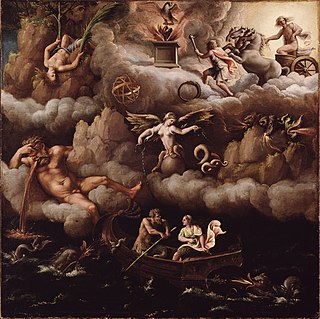
A monster is a type of fictional creature found in horror, fantasy, science fiction, folklore, mythology and religion. Monsters are very often depicted as dangerous and aggressive, with a strange or grotesque appearance that causes terror and fear, often in humans. Monsters usually resemble bizarre, deformed, otherworldly and/or mutated animals or entirely unique creatures of varying sizes, but may also take a human form, such as mutants, ghosts, spirits, zombies, or cannibals, among other things. They may or may not have supernatural powers, but are usually capable of killing or causing some form of destruction, threatening the social or moral order of the human world in the process.

"Dies irae" is a Latin sequence attributed to either Thomas of Celano of the Franciscans (1200–1265) or to Latino Malabranca Orsini, lector at the Dominican studium at Santa Sabina, the forerunner of the Pontifical University of Saint Thomas Aquinas in Rome. The sequence dates from the 13th century at the latest, though it is possible that it is much older, with some sources ascribing its origin to St. Gregory the Great, Bernard of Clairvaux (1090–1153), or Bonaventure (1221–1274).
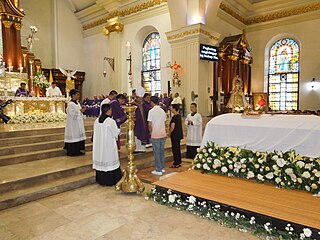
A Requiem or Requiem Mass, also known as Mass for the dead or Mass of the dead, is a Mass of the Catholic Church offered for the repose of the soul or souls of one or more deceased persons, using a particular form of the Roman Missal. It is usually celebrated in the context of a funeral.

Frankenstein's monster, also referred to as Frankenstein, is a fictional character that first appeared in Mary Shelley's 1818 novel Frankenstein; or, The Modern Prometheus as its main antagonist. Shelley's title compares the monster's creator, Victor Frankenstein, to the mythological character Prometheus, who fashioned humans out of clay and gave them fire.
Yang Zhu, also known as Yangzi, was a Chinese philosopher during the Warring States period. An early ethical egoist alternative to Mohist and Confucian thought, Yang Zhu's surviving ideas appear primarily in the Chinese texts Huainanzi, Lüshi Chunqiu, Mengzi, and possibly the Liezi and Zhuangzi. He founded the philosophical school of "Yangism".
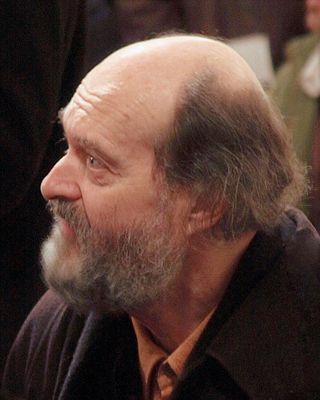
Cantus in Memoriam Benjamin Britten is a short canon in A minor, written in 1977 by the Estonian composer Arvo Pärt, for string orchestra and bell. The work is an early example of Pärt's tintinnabuli style, which he based on his reactions to early chant music. Its appeal is often ascribed to its relative simplicity; a single melodic motif dominates and it both begins and ends with scored silence. However, as the critic Ivan Hewett observes, while it "may be simple in concept...the concept produces a tangle of lines which is hard for the ear to unravel. And even where the music really is simple in its audible features, the expressive import of those features is anything but." A typical performance lasts about six and a half minutes.
John Scotus Eriugena, also known as Johannes Scotus Erigena, John the Scot, or John the Irish-born was an Irish Neoplatonist philosopher, theologian and poet of the Early Middle Ages. Bertrand Russell dubbed him "the most astonishing person of the ninth century". The Stanford Encyclopedia of Philosophy states that he "is the most significant Irish intellectual of the early monastic period. He is generally recognized to be both the outstanding philosopher of the Carolingian era and of the whole period of Latin philosophy stretching from Boethius to Anselm".
A funeral march, as a musical genre, is a march, usually in a minor key, in a slow "simple duple" metre, imitating the solemn pace of a funeral procession. Some such marches are often considered appropriate for use during funerals and other sombre occasions, the best-known example being the third movement of Chopin's Piano Sonata No. 2. Handel uses the name dead march, also used for marches played by a military band at military funerals.

Manfred: A dramatic poem is a closet drama written in 1816–1817 by Lord Byron. It contains supernatural elements, in keeping with the popularity of the ghost story in England at the time. It is a typical example of a Gothic fiction.
Green Lantern/Superman: Legend of the Green Flame was a one-shot prestige format comic book published in 2000 by DC Comics.

Frankenstein is a 1910 American short silent horror film produced by Edison Studios. It was directed by J. Searle Dawley, who also wrote the one-reeler's screenplay, broadly basing his "scenario" on Mary Shelley's 1818 novel Frankenstein; or, The Modern Prometheus. This short motion picture is generally recognized by film historians as the first screen adaptation of Shelley's work. The small cast, who are not credited in the surviving 1910 print of the film, includes Augustus Phillips as Dr. Frankenstein, Charles Ogle as Frankenstein's monster, and Mary Fuller as the doctor's fiancée.

Victor Frankenstein is a fictional character who first appeared as the titular main protagonist of Mary Shelley's 1818 novel, Frankenstein; or, The Modern Prometheus. He is a Swiss scientist who, after studying chemical processes and the decay of living things, gains an insight into the creation of life and gives life to his own creature. Victor later regrets meddling with nature through his creation, as he inadvertently endangers his own life and the lives of his family and friends when the creature seeks revenge against him. He is first introduced in the novel when he is seeking to catch the monster near the North Pole and is saved from near death by Robert Walton and his crew.

Frankenstein is a 2004 American television miniseries based on the 1818 novel Frankenstein; or, The Modern Prometheus by Mary Shelley.

"Hush'd Be the Camps To-Day" is a poem by Walt Whitman dedicated to Abraham Lincoln. The poem was written on April 19, 1865, shortly after Lincoln's assassination. Whitman greatly admired Lincoln and went on to write additional poetry about him: "O Captain! My Captain!", "When Lilacs Last in the Dooryard Bloom'd", and "This Dust Was Once the Man." "Hush'd" is not particularly well known, and is generally considered to have been hastily written. Some critics highlight the poem as Whitman's first attempt to respond to Lincoln's death and emphasize that it would have drawn comparatively little attention if Whitman had not written his other poems on Lincoln.

Frankenstein; or, The Modern Prometheus is an 1818 novel written by English author Mary Shelley. Frankenstein tells the story of Victor Frankenstein, a young scientist who creates a sapient creature in an unorthodox scientific experiment. Shelley started writing the story when she was 18, and the first edition was published anonymously in London on 1 January 1818, when she was 20. Her name first appeared in the second edition, which was published in Paris in 1821.
"A slumber did my spirit seal" is a poem that was written by William Wordsworth in 1798 and first published in volume II of the 1800 edition of Lyrical Ballads. It is part of a series of poems written about a mysterious woman named Lucy, whom scholars have not been able to identify and are not sure whether she was real or fictional. Although the name Lucy is not directly mentioned in the poem, scholars nevertheless believe it to be part of the "Lucy poems" due to the poem's placement in Lyrical Ballads.
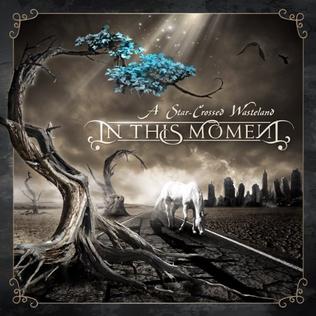
A Star-Crossed Wasteland is the third studio album by American rock band In This Moment. The album was first released in Germany on July 9, 2010, and later in the United States by Century Media. It was named by Alternative Press as one of the most anticipated releases of 2010. This is the first album not to feature bassist Jesse Landry; it is also the band's only album to feature bassist Kyle Konkiel, and the last album with founding members rhythm guitarist Blake Bunzel and drummer Jeff Fabb.
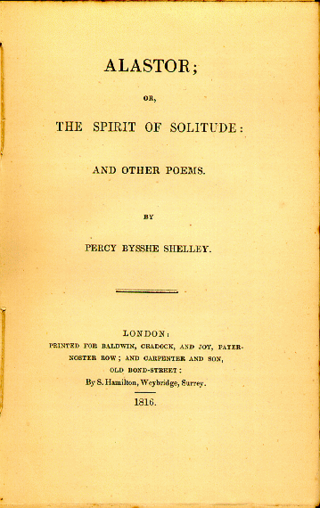
"Mutability" is a poem by Percy Bysshe Shelley which appeared in the 1816 collection Alastor, or The Spirit of Solitude: And Other Poems. Half of the poem is quoted in his wife Mary Shelley's novel Frankenstein; or, The Modern Prometheus (1818) although his authorship is not acknowledged, while the 1816 poem by Leigh Hunt is acknowledged with the name of the author given. Only Percy Bysshe Shelley is not acknowledged as an author. There is also a prose version or further elaboration of the same themes of the poem in Frankenstein that immediately precedes the quotation of the poem.

Insects and human ethical obligations towards them have been discussed by a number of writers and figures throughout history, many of whom, arguing from a variety of different perspectives, have contended that there exists a moral obligation towards not harming or killing insects. According to generally accepted definitions in animal welfare and agricultural ethics, however, it is argued that individual insects do not have a "right to life".















